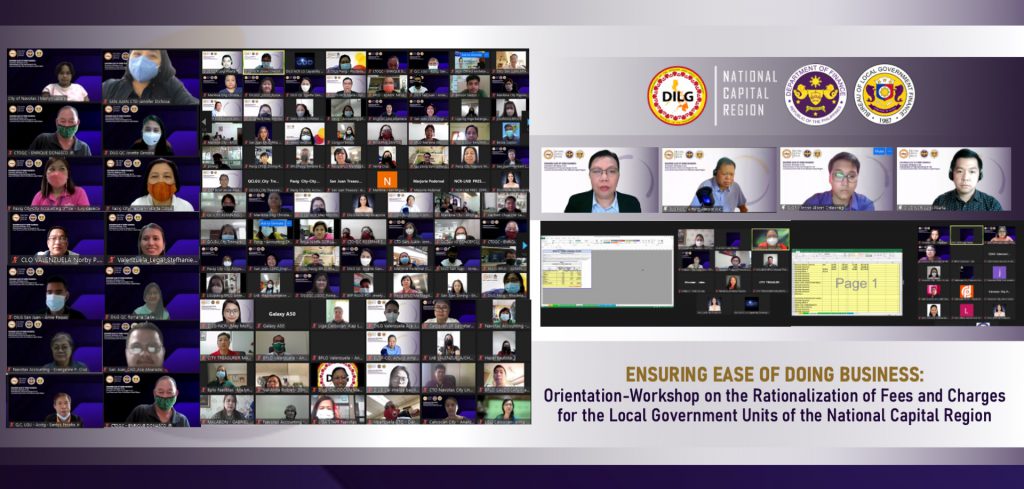
âThe government cannot bring about recovery by itself; it will need the private sector to cooperate and make investments. Let us make it easier for them to determine the potential returns of this investment by minimizing uncertainty with regard to the cost of Doing Business. In doing so we will be able to facilitate job creation to give our people much needed income, which they will use to purchase goods and services, generating profits that will allow business owners to expand their operation to eventually compete in the global arena. The exact thing we need to take our economy to greater heightsâ. These are a few words from the opening message of the DILG-NCR Regional Director, RD Maria Lourdes L. Agustin, CESO III, as DILG-NCR kicked off the first of four batches of the two-day activity titled âEnsuring Ease of Doing Business: Orientation-Workshop on the Rationalization of Fees and Chargesâ.
The DILG-NCR advocates the importance of the utilization of the LFC Toolkit in updating the LGUâs revenue ordinances and codes. With this, to build a strong enabling environment for good local governance, the orientation-workshop was held, its key agenda being the DOF-DILG Joint Memorandum Circular No. 2019-01 which provided for the Guidelines for the Review, Adjustment, Setting and/or Adoption of Reasonable Regulatory Fees and Charges of Local Government Units. Workshops on the use of the Local Fees and Charges (LFC) Toolkit were also conducted.
The first batch was held on August 19-20, 2021, with participants from the cities of Caloocan, Malabon, Valenzuela, Navotas; the second batch, with attendees from the cities of San Juan, Marikina, Pasig, Quezon City, on August 26-27, 2021; the third batch, with attendees from the cities of Manila, Makati, Taguig and Mandaluyong, on September 2-3, 2021; and the fourth batch, with participants from the cities of Pasay, Parañaque, Las Piñas, Muntinlupa and the Municipality of Pateros, on September 9-10, 2021.
The JMC provides guidelines for LGUs in setting reasonable fees and charges in line with the provisions of the Local Government Code (LGC) of 1991, with a view of maintaining the right balance with the cost of services rendered to the public. The orientation-workshop provided local functionaries an opportunity to apply and utilize the Local Fees and Charges Toolkit, which was developed by the DILG, BLGF and USAID in 2014 based on a study using the cost-accounting framework.
Under these laws and guidelines, LGUs have the leeway to adjust the fees they impose, as long as these conform to the variables in the tool kit, which should be used in determining the rates and, as much as possible, be applied uniformly across similar or comparable services and functions offered by other LGUs.
The workshop concluded with the participants presenting the rationalized regulatory rates as their workshop outputs. Local finance experts from the DOF-BLGF, Local Treasury Examiner II â Arturo C. Amparado and Policy Development Officer II â Jessie Albert Catapang, served as resource persons for this series of activities.
